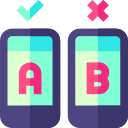Routines That Make Digital Study Stick
Link a ten-minute lesson to fixed moments—morning tea, bus stop, or pre-dinner pause. Keep materials preloaded, headphones ready, and notifications quieted. What cue will you anchor this week? Post it to keep yourself accountable.
Routines That Make Digital Study Stick
Pair listening and reading with speaking and writing tasks. For every passive lesson, leave a short voice memo or two-sentence journal entry. Share your favorite prompt that nudged you from recognition into confident production.







